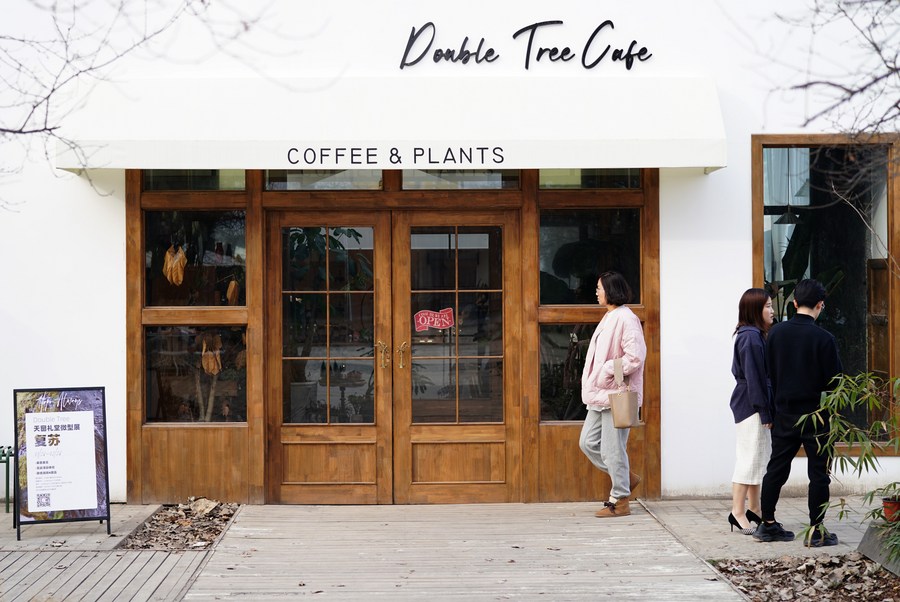Across China: Glimpse into brewing coffee craze in tea-loving China
2021-04-19 15:47:22 来源: Xinhua 责任编辑: 陈佳丽|
Customers stop at a cafe in Chang'an District of Xi'an, northwest China's Shaanxi Province, Feb. 17, 2021. (Xinhua/Shao Rui) In China's first- and second-tier cities, coffee is on course to obtain a status on par with tea. There were about 108,000 coffeehouses in China by the end of 2020, a figure projected to be 123,000 by 2023. BEIJING, April 18 (Xinhua) -- French writer Honore de Balzac could not live or work without the aroma of coffee, they say. Neither can Chen Fang (pseudonym). An auto engineer based in Guangzhou, south China's Guangdong Province, Chen has a grind-and-brew coffee maker both at home and in the office. "I can't go without my two cups a day," said Chen, adding that "It's part of my daily routine, nothing about jumping on a bandwagon." In China's first- and second-tier cities such as Beijing, Shanghai and Guangzhou where Chen lives, coffee is on course to obtain a status on par with tea, a traditional drink with a history stretching back thousands of years in the country. RISE OF COFFEE Habitual coffee drinkers in China's big cities consume an annual average of 300 cups, within a whisker of the figure (329) in the United States, according to a report by Deloitte China in collaboration with MM Capital, though per capita annual consumption lags far behind at nine cups on Chinese mainland. There were about 108,000 coffeehouses in China by the end of 2020, a figure projected to be 123,000 by 2023, said Deloitte China, noting that 75 percent of these businesses were nestled in first- and second-tier cities. Released on Deloitte China's website on April 12, the report focused on the fresh-ground coffee market in China. Shanghai, one of the first Chinese cities to bring in coffee consumption in the 19th century, operates the most coffee shops in the world, said The Beijing News on Thursday. The metropolis bristles with over 6,000 coffeehouses, more than three times the figure in New York, the newspaper quoted data from Dianping, the Chinese version of Yelp, OpenStreetMap and other sources as saying. A search query on Tianyancha, a Beijing-based business data platform, showed that 2,170 of the coffee shops in Shanghai have operated for more than 15 years. Coffee's penetration rate, i.e., the ratio between habitual consumers and the total polled in the Deloitte research, clocks in at 67 percent in China's first- and second-tier cities. The figure is 66 percent for tea.
A customer reads books at a cafe in Chang'an District of Xi'an, northwest China's Shaanxi Province, Feb. 17, 2021. (Xinhua/Shao Rui) PROFILE OF CHINESE COFFEE DRINKERS Coffee consumers in China are mostly white-collar workers aged between 20 to 40. In first-tier cities the upper limit may extend to consumers 50 years of age, said the Deloitte China report. The majority of them have graduated from college and earn a relatively handsome salary of 18,000 yuan a month (about 2,757 U.S. dollars). Grassroots employees in companies constituted the largest consumer group, accounting for 24 percent of the total coffee drinkers between 2018 and 2019, according to separate research by the Health Times. They were followed by enterprise management and professionals, said the media outlet under the umbrella of the People's Daily. Most of China's coffee consumers come under significant pressure at work, regularly working overtime, according to the Deloitte report. WHAT COFFEE DO THEY PREFER This sets the stage for Chinese consumers' increasing migration from milk coffee to black coffee, said the report. Consumption of Americano and cold brew coffee has rallied from 24 percent in 2017 to 49 percent while caramel macchiato has seen its market share shrink from 21 percent to six percent during the same period. For Chen, it is a matter of course not to add milk or sugar to coffee. "I'm a little bit addicted," she admitted. The Deloitte report believed that Chinese consumers have developed both psychological and physiological dependence on coffee. The thriving of indigenous startups such as Luckin and Lyan played an important role in the formative years (2017-2020) of China's habitual coffee consumption, said the report. A preference for healthy drinks and the original flavor of coffee beans also contributed to the expansion of black coffee in the market, according to the report. Black coffee is probably the future, it concluded. ■ |






